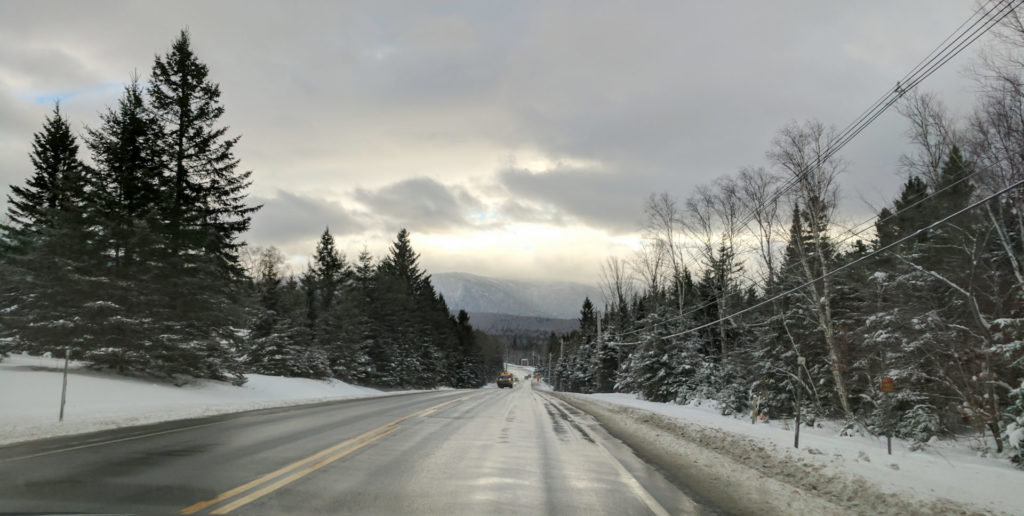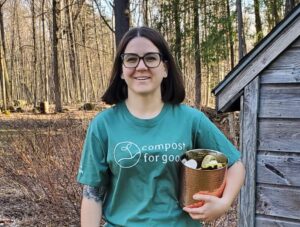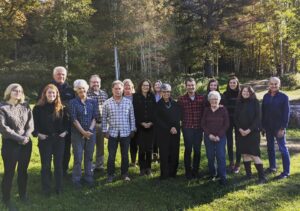Together with six other area nonprofits, AdkAction authored a letter sent to Governor Hochul last month, urging her administration to take the next steps needed to protect our water from road salt pollution. Governor Hochul has been instrumental in assembling the Road Salt Reduction Task Force that presented its findings in September. Now is the time to move forward with its recommendations.
You can read the complete text of our letter to Governor Hochul below:
Dear Governor Hochul,
This fall, thanks to the dedicated efforts of your administration, subject matter experts, state agency leaders, and steadfast legislative sponsors, the Adirondack Road Salt Reduction Task Force Assessment and Recommendations report was released, confirming the negative impact of road salt on the Adirondacks’ aquatic and terrestrial ecosystems, human health, and property, while raising key recommendations and six actionable pilot projects. This comprehensive report provides the roadmap to reducing road salt in the Adirondack Park, but it requires accountability, a plan of action, and funding to implement.
We, the coalition of non-governmental organizations in the Adirondacks which championed the creation of a state-level road salt task force, are again speaking with one voice about the path ahead. It’s time to give road salt a new identity in New York State – one of innovation and progress.
We urge you to lead New York in advancing three key actions to protect our Adirondack water:
1. Use the Model for Supportive Accountability: Establishing a statewide joint-agency council and advisory committee, following the model set forth by the Invasive Species Council and Advisory Committee, to serve as a dedicated body guiding the implementation of the Task Force Report’s recommendations. In doing so:
- Create a staff position at the Council or Chamber level to lend support and accountability for the Council, DEC, and DOT, rather than against them. A dedicated staff member is critical to helping work across agencies and offices to help make holistic progress on this interconnected and complex issue.
- Establish a New York State chloride water quality standard for the protection of aquatic life, drawing from from the EPA’s national recommended water quality criteria. Recognizing a future goal for regional standards, establishing this statewide threshold is essential to create guardrails for future progress, and in keeping with all New England states and many other Northeast states which have already done so.
2. Develop an Action and Implementation Plan: Over the next seven years (2023 – 2030), there are immediate and sustained long-term efforts that will be necessary to make progress implementing Task Force recommendations. Today, there is great need to take quick action on Pilot Category 1, which simply requires sustained funding, to continue improving its ongoing efforts this winter season. Simultaneously, a broader and more robust plan for future seasons must be developed in the next twelve months in preparation for the next winter season (2024-2025). This kind of effective, pragmatic planning takes time and must begin soon.
- This winter (2023-2024), we strongly encourage the DOT focus on implementing the specific pilot projects recommended in the Task Force Report.
- Simultaneously, and with the support of the new joint-agency and advisory committee, develop a plan for (1) agency implementation or (2) implementation by other parties such as nonprofit organizations, of all pilot efforts, Best Management Practices, and Outreach, Education, and Transparency recommended initiatives for the next winter (2024-2025 and 2025-2026) seasons.
- Develop a plan that can be incrementally scaled statewide starting in 2026 in the following five years by 2030.
3. Fund Using Savings: If established, the Interagency Council can be tasked with developing a detailed, line-item budget which follows the Best Management Practices Training, Public Outreach, Education, Transparency, and Pilot Project recommendations outlined in the Task Force report, ideally prior to the following budget cycles.
- A percentage of New York State’s salt budget can be re-allocated to partially fund this effort, rather than through new funding, if given the vote of confidence to do so. Sustainable winter road management is a cost control effort; by safely reducing material outputs on roadways according to a comprehensive plan, those savings can be reinvested elsewhere in the agency budget. In the Lake George area and in other areas across the North Country where sustainable winter road maintenance efforts have been in place for years, 50% budget savings has been achieved over time, providing confidence for New York State to plan for nominal 2% material cost reallocation year over year. These dollars already exist in the budgets as material waste, and will not be felt at the roadway safety level. Several counties and towns are already successfully reallocating their budgets to make progress, and our State can do the same.
- Expand eligibility criteria in the next Consolidated Funding Application cycle so existing granting programs across marketing, water quality, and health can fund common sense Task Force Report recommendations.
○ The Water Quality Improvement Program allocations under the Water Infrastructure Improvement Act should be considered for expanded project eligibility to include projects focused on purchasing road salt reduction equipment (brine-related, segmented plows, etc) and on participating in existing sustainable winter road maintenance training programs.
○ ESD’s Market New York should be considered for expanded eligibility around marketing campaigns critical New York State environmental public service information, including in the next five years for a road salt reduction public outreach campaign. Prototypes for this campaign have already been developed, tested, and piloted by members of our coalition and can immediately be scaled.
○ Screen for other existing funding sources for broadened eligibility criteria to help create windows of opportunity to address salt pollution.
Thanks to the diligent work of all those who contributed to the Adirondack Road Salt Task Force Report, our State is in an incredible position for practical action, and it should start this season. We know this issue matters greatly to all New York State residents and to you. We are prepared to support, contribute, and work however we can to help make progress real and ensure our roads remain safe.
Sincerely,
Sawyer Bailey, Executive Director, AdkAction
Michael Barrett, Executive Director, Adirondack Mountain Club
Kevin Chlad, Director of Government Relations, Adirondack Council
Scott Ireland, Executive Director, Adirondack Lakes Alliance
Zoe Smith, Executive Director, Adirondack Watershed Institute, Paul Smith’s College
Tom Swayne, President, Upper Saranac Foundation
Kelley Tucker, Executive Director, Ausable River Association






